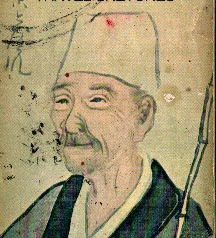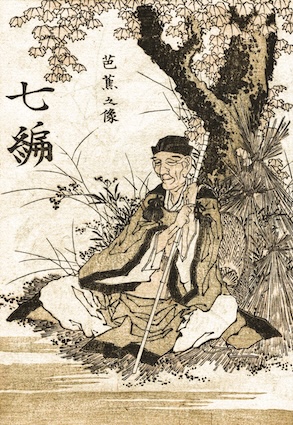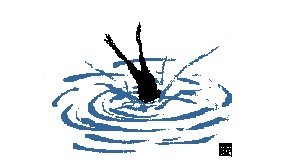 Matsuo Bashō (1644 – 1694), was the most famous poet of the Edo period in Japan and is still renowned as perhaps Japan’s most popular poet. Today he is recognized as the greatest master of haiku (then called hokku). And his most famous haiku, probably the most famous poem in Japan, is his brief poem about the frog jumping into the water of an old pond. It has the same iconic status in Japanese poetry as William Carlos Williams’ red wheelbarrow has in American poetry, William Wordworth’s daffodils has in English poetry and William Butler Yeats’s Lake Isle of Innisfree has in Irish poetry.
Matsuo Bashō (1644 – 1694), was the most famous poet of the Edo period in Japan and is still renowned as perhaps Japan’s most popular poet. Today he is recognized as the greatest master of haiku (then called hokku). And his most famous haiku, probably the most famous poem in Japan, is his brief poem about the frog jumping into the water of an old pond. It has the same iconic status in Japanese poetry as William Carlos Williams’ red wheelbarrow has in American poetry, William Wordworth’s daffodils has in English poetry and William Butler Yeats’s Lake Isle of Innisfree has in Irish poetry.
Bashō’s frog haiku is almost definitely the most famous haiku ever composed. Here is the poem in the original Japanese:
(Kanji)
古池や蛙飛こむ水のおと
(Hiragana)
ふるいけやかわずとびこむみずのおと
(Romaji)
Furuike ya kawazu tobikomu mizu no oto
And here is a literal translation:
Fu-ru (old) i-ke (pond or ponds) ya (an exclamation), ka-wa-zu (frog or frogs) to-bi-ko-mu (jumping into) mi-zu (water) no o-to (sound or sounds)
This haiku, by Bashō, was said to have occurred when his Zen master, Boncho, was visiting him. According to legend, the master had asked Bashō a koan-like question (meaning a riddle with no answer) and Bashō, instead of searching for an answer, replied with “a frog jumps into, the sound of water.” This may be true as Bashō was living, at that time, in a cottage-hut his students had built for him on the marshy ground at the edge of what is now Tokyo. So he was living in an area with plenty of frogs.
Another account of the genesis of this famous haiku, one I discovered in Hiroaki Sato’s On Haiku (New Directions, 2018), has Bashō as a sardonic, self-deprecating host being so destitute that all he could offer to his guests, as a form of entertainment, was the occasional sound of a frog plopping into a stagnant pool of water.
The first line is a simple setting of the scene -“The old pond.” A frog appears, suggesting twilight. To the Japanese, frogs are pleasant little creatures, full of energy and activity. It jumps in the pond and creates a sound. While most translators suggest one frog, Lafcadio Hearn (see first translation below) suggests multiple frogs. The word “oto” is onomatopoeic. It is interesting to see various Western attempts to translate this word and sound. There is “splash” (used by six of the translators below: Jozy Big Mountain, Lucien Stryk, Eli Siegel, Peter Beilenson, Dion O’Donnol and Cid Corman); there is “plop” (used by four: Alan Watts, Peter Beilenson, James Kirkup and Harold Stewart); there is “plash” (used by Clare Nikt); there is “plunks” (used by Dick Batten); there is “kerplash!” (used by Michael R. Burch); then there is my favourite, “kerplunk!” (used by Allen Ginsberg).
It is difficult to account for the immense popularity of this brief poem. Nothing much happens; nothing much is said; no great emotion is evoked. One or more frogs are jumping into one or more ponds making one or more sounds. One explanation of its popularity in Japanese culture is this: It’s important to note that Bashō’s poem was revolutionary at the time for its focus on the sound of the frog jumping into the water. For centuries prior to this, it was a standard trope in Japanese and Chinese literature to refer to the frog’s croak. In this way, the seemingly young frog is disruptive to the “old pond,” which might be seen as old ways of writing haiku, adding a possible interpretive and allusive layer to this poem’s immediate surface images. (HAIKU MISSIONARY: AN ANNOTATED RESPONSE TO ALAN WATTS’ “HAIKU”)
Whatever the reason, the poem is probably the best known haiku of all time. It has even been parodied in Japan where Kamedi Bōsai (1752-1826) wrote:
Old pond—
after that time
no frog jumps in
Sengai Gibon (1750-1837) rewrote it twice:
Old pond—
something has PLOP
just jumped in
Old pond
Bashō jumps in
the sound of water
An anonymous eighteenth century senryū (a kind of satiric haiku) reads
Master Bashō
at every plop
stops walking
Fresh translations and fresh interpretations of the poem continue to appear. Here is one with an environmental bias by Stephen Addiss (1935-2022):
Old pond paved over
into a parking lot—
one frog still singing
And here is another, this time translated into a Limerick by Alfred H. Marks:
There once was a curious frog
Who sat by a pond on a log
And, to see what resulted,
In the pond catapulted
With a water-noise heard round the bog.
I tried to translate the poem myself but, knowing no Japanese and not having the brevity associated both with the haiku and with the poems on this post, it morphed into a sonnet.
Bashō’s Frog
That day a dark, vermillion, winter sky,
like a Turner water-colour, was seen
reflected in an old pond where, nearby,
the poet Bashō watched a small, unclean
and speckled frog jump in the evening air
and meet the water with a gentle plop,
an almost soundless splash, a plash near where
the other sounds of twilight seemed to stop
as Bashō, without writing, memorised
that gentle movement and, with a wry smile,
acknowledged to himself he had devised
a way to turn a frog into a style.
So: this is my version of Bashō’s frog.
Go: post your comments on my briefpoems blog.

Portrait of Basho by Hokusai
ENGLISH TRANSLATIONS
Old pond – frogs jumped in – sound of water.
Lafcadio Hearn
***
The old mere!
A frog jumping in
The sound of water.
Masaoka Shiki
***
A lonely pond in age-old stillness sleeps …
Apart, unstirred by sound or motion … till
Suddenly into it a lithe frog leaps.
Curtis Hidden Page
***
The old pond;
A frog jumps in —
The sound of the water.
R. H. Blyth
***
An old pond —
The sound
Of a diving frog.
Kenneth Rexroth
***
Pond, there, still and old!
A frog has jumped from the shore.
The splash can be heard.
Eli Siegel
***
The old pond, yes, and
A frog-jumping-in-the-
Water’s noise!
G. S. Fraser
***
The old pond, aye! And the sound of a frog leaping into the water.
Basil Hall Chamberlain
***
old pond
a frog jumps into
the sound of water
Jane Reichhold
***
An old pond
A frog jumps in —
Sound of water.
Geoffrey Bownas and Anthony Thwaite
***
old pond
frog leaping
splash
Cid Corman
***
The silent old pond
a mirror of ancient calm,
a frog-leaps-in splash.
Dion O’Donnol
***
ancient is the pond —
suddenly a frog leaps — now!
the water echoes
Tim Chilcott
***
The old pond,
A frog jumps in:
Plop!
Alan Watts
Breaking the silence
Of an ancient pond,
A frog jumped into water—
A deep resonance.
Yuasa Nobuyuki
***
The old pond
A frog jumped in,
Kerplunk!
Allen Ginsberg
***
An old pond
A frog jumping
Sound of water
Lindley Williams Hubbell
***
Big old pond,
the little frog leaps:
Kerplash!
Michael R. Burch
***
Listen! a frog
Jumping into the stillness
Of an ancient pond!
Dorothy Brittan
***
Old pond,
Young frog.
Splash!
Jozy Big Mountain
***
The old green pond is silent; here the hop
Of a frog plumbs the evening stillness: plop!
Harold Stewart
***
Old pond
leap — splash
a frog.
Lucien Stryk
***
The old pond —
a frog jumps in,
sound of water.
Robert Hass
***
OLD DARK SLEEPY POOL. . .
QUICK UNEXPECTED
FROG
GOES PLOP! WATER SPLASH
Peter Beilenson
***
dark old pond
:
a frog plunks in
Dick Batten
***
At the ancient pond
a frog plunges into
the sound of water
Sam Hamill
***
Hear the lively song
of the frog in
BrrrBrrrBrrptyBrrrBrrrrrrrrrrIp
Plash!
Clare Nikt
***
At a good old pond
a bullfrog has just hopped in.
What a sound was spawned.
Aaron Poochigian
***
pond
frog
plop!
James Kirkup
***
frog jumps in –
LINKS
A Contrarian View of Bashō’s Frog
Further translations of the poem (including a Limerick version) available on the Suiseki blog.
Thirty-two translations and one commentary.
Jane Reichhold discusses the poem on her website.
Dan King gives his response to the poem
Chen-ou Liu discusses the poem.
David Landis Barnhill discusses the poem.

Great sonnet. So many ways to describe one event. That’s poetry.
LikeLike
I forget who said it, but the best translation I have read is to the effect:
The ancient pond = Universal Mind or Consciousness, still and calm;
The frog jumps = ‘I’, that is Basho as an aware individual and not an egocentric person;
The splash is heard = the Primordial Vibration, termed Aum or Om in Buddhist circles
Love It
LikeLike
The sleeping pond
A frog jumps in —
Splash!
LikeLike
I like Mark Weiss’s slightly irreverent take ….
Frog jumps in,
you hadda be there
LikeLike
Pingback: Frog Haiku by Basho – Suiseki
Pingback: Frogs are Nothing Fancy – nicktomjoe
Pingback: 'Basho's Frog' by Conor Kelly | Society of Classical Poets
Pingback: Frogs – Basho’s Many English Frogs | Brief Poems | word pond
Old pond, fresh blossom
Frog leaping through moonlight air
Plash … duckweed closes.
LikeLike
Congratulations for a nice post. I came here because I was looking for who translated it as:
“old pond
frog jump in
water sound” — like the way I remember it from decades ago.
Thanks for the rich info!
LikeLike
Reblogged this on Elliptical Movements and commented:
Containing three versions by me, and loads by far better translators.
LikeLike
Wonderful post and I love your sonnet too.
The Lucien Stryk version on my shelf is the same words as you’ve put, but different punctuation:
Old pond,
leap-splash–
a frog.
(where — is meant to be one of those long dashes).
LikeLike
Pingback: Dewdrops – Brief poems by Kobayashi Issa | Brief Poems
Pingback: Pebbles – Brief poems by Jane Hirshfield | Brief Poems
Pingback: Li Po’s Quiet Night Thought | Brief Poems
Pingback: Mountain Dreams – Brief Poems by Francis Harvey | Brief Poems